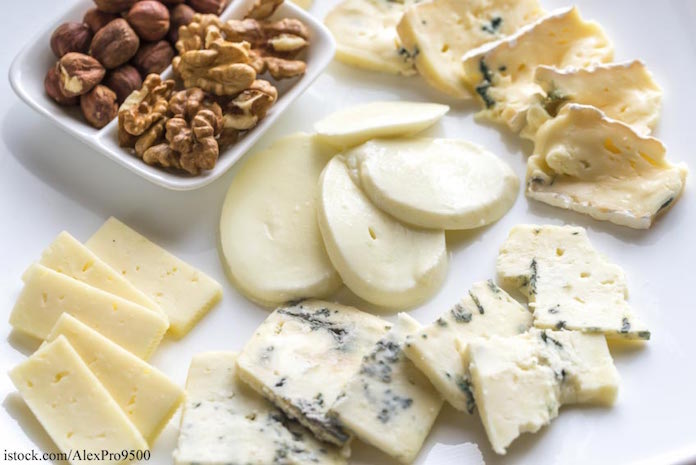Every month there is at least one food recall about a potentially dangerous food in the United States. These recalls are for foods that may be contaminated with E. coli, Listeria monocytogenes, Salmonella, cyclospora, and Campylobacter. Unfortunately, some foods are inherently risky because of the way they are grown or prepared. While the general public certainly is at risk for illness from these foods, there are some people who can become seriously ill if they are infected. There are safer food choices for anyone who is at high risk for food poisoning complications.

People at higher risk for serious complications from food poisoning include the very young, the elderly, pregnant women, people with chronic health problems such as diabetes, and anyone with a compromised immune system. Food safety experts warn these groups to avoid certain foods. But what can you eat instead? Remember that these choices are safer, not guaranteed safe. Any food can be contaminated from farm to fork.
Meat, Poultry, and Seafood
For meats, avoid raw or undercooked meat or poultry. Always cook meats, fish, and poultry to safe final internal temperatures. These are 145°F for fish and whole cuts of beef and pork, 165°F for all chicken and turkey products, and 160°F for ground beef, pork, veal, and anything made with eggs. Avoid raw sushi, sashimi, ceviche, and rare burgers. Cold smoked fish is also problematic, as are raw oysters.
Instead, heat previously cooked seafood, and any leftovers for that matter, to 165°F. Buy canned fish and seafood, and heat any smoked fish to 165°F. Cook shellfish until the shells open. Always cook burgers, meatloaf, and meatballs to 160°F (165°F if made with poultry), and check those temps with a food thermometer.
Milk and Cheese
Do not consume unpasteurized (raw) milk, cream, or yogurt. And avoid cheese made with raw milk. Instead, drink pasteurized milk and products and cheese made with pasteurized milk.
Soft cheeses, those made from pasteurized milk or not, can be inherently risky. Avoid feta, brie, camembert, blue-veined cheese, and queso fresco. Safer food choices include hard cheeses, processed cheeses, cream cheese, and mozzarella.
Produce
Experts have warned everyone, but especially high risk populations, about the dangers of raw sprouts. Because the seeds that are used to grow the sprouts can be contaminated on the inside, and because the growing environment is so favorable for bacterial growth, it’s best to avoid them, or cook the sprouts before consumption.
Unwashed fresh vegetables are risky. Lettuce and salads that are unwashed are risky as well. Enoki mushrooms have a problematic history. It’s best to eat cooked vegetables, and if you choose to eat salads and uncooked vegetables, wash them thoroughly unless they are prewashed.
Eggs
Eggs can be contaminated with Salmonella and other bacteria on the inside, because the hen’s ovaries cans harbor pathogens. Do not eat raw or undercooked eggs or anything made from them, including cookie dough, homemade eggnog, homemade mayonnaise, and homemade Caesar salad dressings.
Use pasteurized eggs if you want to make a recipe that doesn’t cook the eggs. Follow the expiration dates to the letter. Safer food choices include purchased cookie dough, eggnog, mayonnaise, and Caesar salad dressing.
Flour
Flour is a raw agricultural product, just like produce. It should never be eaten by anyone uncooked. Do not make and eat raw cookie dough or make milkshakes with cake mixes. Do not taste batter or dough before it’s baked. And do not make homemade play dough for children using raw flour.
You can buy safe cookie dough and even safe flour. Do not try to make safe flour at home in your oven, because it’s difficult to ensure that all of the flour will reach a safe temperature.
Deli Foods
Deli foods are inherently risky for several reasons. The equipment used to cut and slice meats and cheeses is difficult to clean. Many delis can be contaminated with Liberia monocytogenes bacteria. And that pathogen can become persistent in the environment. Do not eat unheated hot dogs, luncheon meats, and deli meats.
Instead, heat hot dogs, luncheon meats, and deli meats to 165°F. Choose canned or shelf-stable pates or meat spreads.
Protect Yourself
In addition to avoiding problematic foods and making safer food choices, there are other things you can do rot protect yourself.
Handle problematic foods listed above as if they are contaminated. Wash your hands frequently when preparing food and before eating.
Always pay attention to food recalls and food poisoning outbreak announcements. Prepare food safely, following food safety rules. Avoid cross-contamination. Buy and use a reliable and accurate food thermometer and use it every time you cook. And know the symptoms of food poisoning so you can get help quickly if you do get sick.

If you have been sickened with a food poisoning infection, contact our experienced attorneys for help with a possible lawsuit at 1-888-377-8900 or text us at 612-261-0856. Our firm represents clients in lawsuits against grocery stores, restaurants, and food processors.




